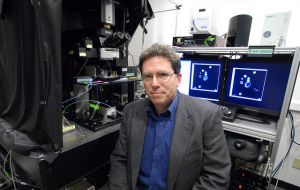MercoPress. South Atlantic News Agency
US scientists discover hub of brain cells, in mice, that controls the desire to eat
 Professor David Anderson: “It was incredibly surprising. It was like you could just flick a switch and prevent the animals from feeding.”
Professor David Anderson: “It was incredibly surprising. It was like you could just flick a switch and prevent the animals from feeding.” US scientists have discovered a central hub of brain cells that may put the brakes on a desire to eat, a study in mice shows. And switching on these neurons can stop feeding immediately, according to the Nature Neurosciences report.
Researchers say the findings may one day contribute to therapies for obesity and anorexia. Experts say this sheds light on the many complex nerve circuits involved in appetite control.
Scientists from the California Institute of Technology suggest the nerve cells act as a central switchboard, combining and relaying many different messages in the brain to help reduce food intake.
Using laser beams they were able to stimulate the neurons – leading to a complete and immediate stop to food consumption.
Professor David Anderson, lead author of the study said “it was incredibly surprising. It was like you could just flick a switch and prevent the animals from feeding.”
Researchers then used chemicals to mimic a variety of scenarios – including feelings of satiety, malaise, nausea and a bitter taste.
They found the neurons were active in all situations, suggesting they may be integral in the response to many diverse stimuli. The cells worked rapidly when mice had taken a full meal, indicating they may also play an important role in the prevention of over-eating.
Professor Anderson said: “These cells represent the first well-defined hub that inhibits feeding in the brain.
“It is likely that similar cells exist in the human brain. If this is true and it can be proved they are involved in inhibiting eating in people, they could one day provide pathways for the development of therapies for many different eating disorders.”
They say they would next like to investigate how this cluster of cells interacts with other well-known nerve centres involved in the promotion of food intake.
The population of neurons involved in the current research are buried in a region of the brain known as the amygdala – an area which is also associated with emotions such as stress and fear.




Top Comments
Disclaimer & comment rules-

-

-

Read all commentsI see a future world where the Government keeps everyone slim and healthy...then realises they live too long...
Aug 02nd, 2014 - 10:49 am 0...then terminates them before they become an old liability....
yeah...already read that novel...Logan's Run..wasn't it..?
A future of brainless zombies controlled by the gig brother government,
Aug 02nd, 2014 - 05:48 pm 0and the small band of rebels that we will all become part of, if we are to see and feel freedom again,
the point being---
stop the government having to much control of your lives...
#1
Aug 04th, 2014 - 08:53 am 0That all depends. I imagine people who have Diabetes and its complications, are largely drain than those who remain relatively healthy until a short but rapid decline in later years.
#2
As with all things, moderation. Obviously a government shouldn't be able to force an “appetite suppressant” on people, but it could make it available to those who perhaps are prone to over indulgence.
Commenting for this story is now closed.
If you have a Facebook account, become a fan and comment on our Facebook Page!